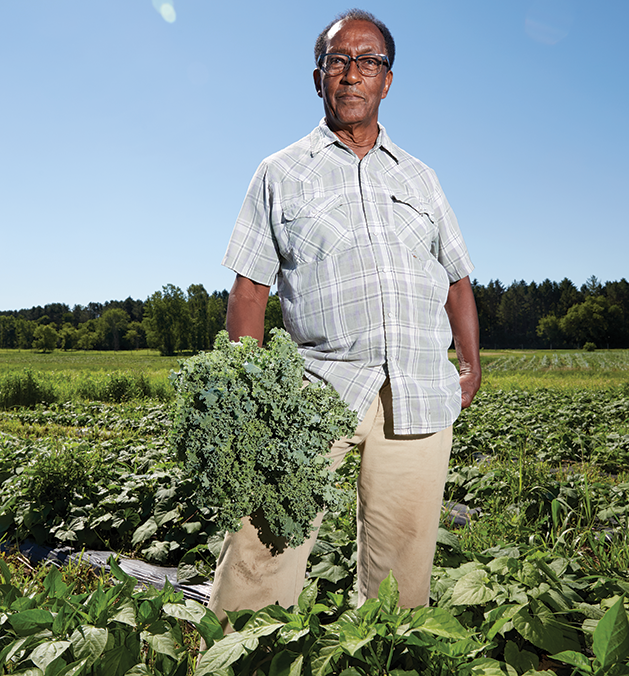
Big River Farms is a St. Croix Valley certified organic vegetable farm comprising, according to Minnesota Food Association programs manager Laura Hedeen, about 30 tillable acres. Small but mighty, these 30 acres have a huge impact on the lives of many Minn. farmers, particularly farmers who are people of color, recent immigrants and/or refugees.
Food from home
Kano Banjaw is a court language translator by day and a newly certified organic farmer by season. He commutes 35–45 minutes each way from his home in New Brighton to his large plot at Big River Farms. Banjaw was born in the Oromo region of Ethiopia; Oromo and Amharic (the official language of Ethiopia) are the two languages he translates. His family in Ethiopia were coffee farmers. Coffee still has great meaning for his family; at holidays like Christmas and New Year’s, he says, he and family members get coffee beans from Ethiopia, roast and grind them to “make coffee in the Ethiopian way.”
He is in his sixth year of farming organic chard, kale, carrots, onions and peppers at Big River Farms. Banjaw also grows hanchotte, an Ethiopian root vegetable. “To serve it, you boil, peel, chop and mash it, add spices and Ethiopian butter,” he says. Hedeen says Banjaw has his own thriving market for the root vegetable, primarily in the local Ethiopian community. Regarding his instruction at Big River Farms, Banjaw’s comments include wonderful, and capable. “I’ve learned a lot,” he says. “I’m very grateful.”
A Practice of Mentorship
In the 2018 growing season, the farm supports about 12 farmers or farming families, whose experience in organic farming ranges from zero to nearly ready to “transition off,” says Hedeen. The land and programs associated with it function overall as a kind of organic farming school, with training to various degrees by accomplished farmer-mentors. The goal, Hedeen says, is farming independence, including facility with the practices and record-keeping necessary for yearly organic farm certification and a plan for marketing and selling the produce each farmer will eventually grow on their own (rented or owned) organic farm.
May Lee began as a mentored farmer—she has four acres of her own—and for the past four years has been employed here as a farmer-mentor. She likes the teaching, because she “likes meeting new people. They learn and I see that they learn. And most are very grateful for the program,” she says. She especially likes organic farming’s “respect for the environment,” she explains. One of her areas of instruction, says Hedeen, is the early-season starting of seedlings in the farm’s greenhouse.
Lee was born in Laos, where her people were farmers. She spent time in a Thai resettlement camp and moved to St. Paul in 1981. She is the proud mother of eight children and 24 grandchildren, most of whom are working, but help her at the farm when they can. Her crops include onions, lettuce, kale, sweet chard, arugula, radishes, peas and sweet potatoes. Hedeen says Lee has largely developed her own markets for the produce she farms here.
Investing in Farmers
Each farmer has their own crop plan, says Hedeen, including crops familiar to Minnesotans but also some distinct to the farmers’ places of origin, including hanchotte, bitter melon, long beans, roselle (a sour, leafy green) and sticky corn (corn that gets sticky when you cook it). While many farmers have developed their own markets, there are several ways the Minnesota Food Association helps farmers sell their produce: by partnering with local farmers’ markets, establishing relationships with wholesale marketers like Shared Ground Farmers’ Co-op which sells to restaurants, and arranging the sale of community supported agriculture (CSA) shares.
Having arrived to the U. S. in 1994, organic farmer Kia Chang is also from Laos. She has six children, including a 9-year-old who often helps out at the farm, says Hedeen. Chang is in her fourth year here and in the first year of independent organic farming certification. She demonstrates a technique she has developed and a tool she and her husband have constructed to sow tiny seedlings while standing up: Basically, it’s a pipe with a spade at the end through which the seedling is dropped into its sowing hole. “It saves my back!” she says with a smile. In addition to her work at the farm, Chang is a dishwasher at the University of Minnesota. “I work there during the school year, from noon on. So starting in spring, I come to the farm first, and then hurry over to my dishwashing job until school is out in summer,” she says.
Chang grows baby corn, onions, cilantro, dill, beets and carrots, among other crops. She has her own markets, including wholesale buyers. She also sells her produce through Big River Farms CSA program. “For a long time I grew a little bit for my family,” she says, adding that after her son helped her find Big River Farms, “I can grow much more.”
“Investing in a CSA is investing in a farmer,” says Hedeen. Find markets and sign up for a 2018 CSA autumn share (or in advance for 2019) on the Food Association website.









